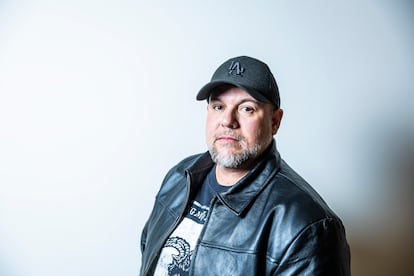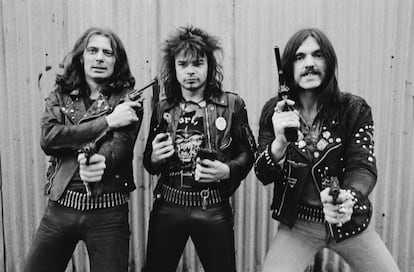Heavy metal as a form of therapy: Long live metalheads in their forties
A new novel by Mexican author Antonio Ortuño narrates with humor, mordacity and a touch of melancholy the reunion of a band of old metalheads who do not quite fit into today’s world


Barry Dávila wears cowboy boots that resonate “like a horse’s hooves against the floor tiles: clop, clop, clop,” a stained, wrinkled leather jacket, Ray-Ban aviator glasses, a Black Sabbath t-shirt, skinny jeans “to better show off the package” and a belt with a notorious Roman eagle buckle. Dávila is a fortysomething metalhead who sweats it out in the gym to maintain his youthful vigor and struts with the pride of “a god from another time” through the shopping center of Zapopan, Guadalajara, Mexico. He is going to resurrect the band that gave him (a little) glory back in the day: La Armada Invencible. Let the world tremble.
La Armada Invencible (The Invincible Armada), by Mexican author Antonio Ortuño, is the novel that narrates the reconstruction of that fictional heavy metal band in a world that is no longer favorable for a bunch of fortysomethings that also want to rebuild their failed lives: the divorces, the layoffs, the ailments, the hopelessness have begun. “To grow old is to stop being the one who lives, to become the one who remembers,” writes Ortuño, who is a columnist in the Mexican edition of EL PAÍS. Because the undercurrent of this text, beyond the bittersweet adventures of these long-haired middle-aged men, with their old Metallica, Slayer and Iron Maiden albums, is the passage of time, that destroyer of dreams. The end of youth. The entry into a new world that is neither understanding nor understood. Especially if you are into heavy metal.
At 47 years old, Ortuño is in the age range of his protagonists, and continues to wear Misfits or Motörhead t-shirts, just like when he was a kid, but he had not yet addressed the subject in his already extensive literary production. “This is the first time that I write directly about music,” he says. “Music is for me an aesthetic reference, much like literature or cinema. But since I am such a fan of metal, I had never felt the inclination to write from there. It felt too close.” When the writer was young he felt that everything in life revolved around rock, but life reveals itself to be a succession of disappointments, and other things take on unexpected relevance. Something like this happens to Barry Dávila and his buddies.

“Eventually, rock became something like philately or fencing: a pastime from another century,” says the author. Indeed, one of the current musical debates is the death of rock as mass music, or as the rhythm of youth, replaced by urban music, reggaeton or electropop; by the individual artist with a digital base instead of the band of colleagues; by all those autotuned voices.
“That music, reggaeton, is now totalitarian; you hear it everywhere, in every store, the algorithm of the apps suggests it even if it doesn’t detect it among your tastes.” Although, as the author also points out, badass metalheads were never mainstream, anyway; they were the irreducible weirdos from school, while the rest were listening to their pop fluff. Always a minority, raising their horned hand. “But this novel is not about teenage rock fervor, it is about love for rock in the old age,” says Ortuño.
The book is arranged like a vinyl record or a cassette tape, with two sides and several chapters/songs on each one, titled like some of the greatest hits of metal. Although the story moves very slowly towards the future (or do they even have a future?) it becomes increasingly richer in the recreation of an increasingly legendary past, through the narration of the apathetic main narrator, the bassist Yulian, but also with the intervention of the other characters, through interviews. “Rock has told itself through interviews; it hasn’t been the subject of historians. That is why I think that is a natural medium for this story,” says the author. In this way, it is a choral but unbalanced narrative, one in which not all voices have the same weight as an increasingly detailed past is woven, sometimes with different versions of the same events — as in life itself.

Although the members of La Armada Invencible are immersed in melancholy, the book Hard, Heavy & Happy, by German psychologist Nico Rose, holds that metalheads are actually happier: the passion for music and the release of energy help reduce anxiety and depression, and headbanging is a healthy way to burn calories.
“Metal gives you a kind of high that other kinds of music don’t,” says the author. To him, heavy metal is confrontational music, not background music. It appeals to you, it even interferes with certain activities such as writing, for which he prefers symphonic (headbangers feel a certain connection with classical music, of whose transcendence and virtuosity they feel, in a certain way, heirs).
Although Ortuño is passionate about other rock genres, the world of heavy metal seemed ideal to tell this story, which satirizes that relentless tribe a lot, but always from a place of reverential respect. “I know punks who became sociologists, journalists or politicians,” says Ortuño, “if you talk to them you can learn a bit about their punk past, but they no longer look like it. Meanwhile, the metalheads I know are still into heavy metal, with all its consequences, wearing their jackets, boots or white tennis shoes, as if digging a deeper and deeper hole.”
Using a little anthropological imagination, one could venture that punk is experienced more as a political militancy that can be continued from other areas (social sciences, politics, journalism), while heavy metal is more like a religion, with its gods, apostles and liturgies, that cannot be lived halfway or abandoned so easily.

Although it is not a humorous novel, it does contain a lot of humor, because being melodramatic was also not the point. “Humor has a bad reputation in literature,” reflects the author. The metalheads themselves lean towards self-irony (the classic documentary about the fictional band Spinal Tap is but one of many examples) and are aware of their own oddities and histrionics. “I, who come from that ultra-violent, bloody country that is Mexico, do not buy into the melodrama; it is impossible in the midst of thousands of murders, disappearances and unrestrained violence, and when most crimes go unpunished.” In these conditions, life can move forward when one “negotiates with reality from other perspectives.”
Intergenerational differences, depicted through the interaction between the protagonists and two young people, Brenda and Luisma, is another theme of the novel. The latter, a guy of the times with a strong ecological and social commitment, is the one who conducts the interviews for a documentary. “He sees metalheads as something exotic, picturesque, that has nothing to do with him,” says the author. Ortuño himself has two college-age children. “Fortunately, they are really into rock. And I never used any methods of coercion,” he jokes.
Ortuño is still there, standing his ground. “I believe that metal is the orthodox, perfect form of rock, it is rock in its purest form, unadulterated, without the need for social, political, geographical alibis; not even cultural. It just is.”
Sign up for our weekly newsletter to get more English-language news coverage from EL PAÍS USA Edition
Tu suscripción se está usando en otro dispositivo
¿Quieres añadir otro usuario a tu suscripción?
Si continúas leyendo en este dispositivo, no se podrá leer en el otro.
FlechaTu suscripción se está usando en otro dispositivo y solo puedes acceder a EL PAÍS desde un dispositivo a la vez.
Si quieres compartir tu cuenta, cambia tu suscripción a la modalidad Premium, así podrás añadir otro usuario. Cada uno accederá con su propia cuenta de email, lo que os permitirá personalizar vuestra experiencia en EL PAÍS.
¿Tienes una suscripción de empresa? Accede aquí para contratar más cuentas.
En el caso de no saber quién está usando tu cuenta, te recomendamos cambiar tu contraseña aquí.
Si decides continuar compartiendo tu cuenta, este mensaje se mostrará en tu dispositivo y en el de la otra persona que está usando tu cuenta de forma indefinida, afectando a tu experiencia de lectura. Puedes consultar aquí los términos y condiciones de la suscripción digital.








































